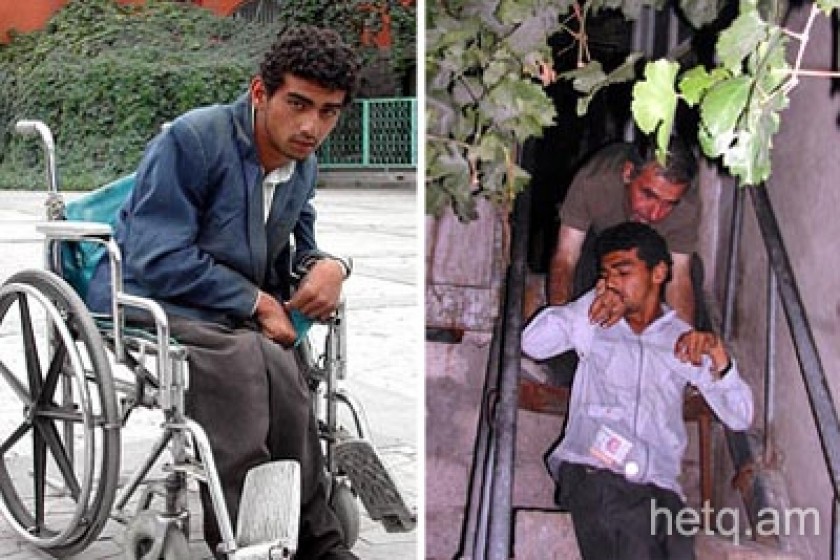
Condemned by fate
17-year-old Nver goes begging in his wheelchair. Hasmik Melikyan found Nver in the public bathroom near the GUM department store in her neighborhood in 1987. "My husband was lying on the couch, he asked 'What's that?' I said, 'A baby'. He asked 'From where?' I said, 'From the bathroom.' He was in a bag, I heard him crying. I took him out of the bag and brought him home."
They took the baby to a doctor, and were told that he was seven days old. "The police came and said, 'We'll take him to an orphanage,' but we didn't let them." They adopted the child and named him Nver (Gift). "He was a blessing from God; I didn't have children and he was, indeed, a gift," Hasmik, a bed-ridden 78-year-old, recalls blissfully.
At the time, she was a worker at the Yerevan meatpacking factory. When he was five, Nver became disabled; his hands and legs stopped functioning. "We raised the boy; my mother-in-law helped us. My Nver was a healthy boy; he could walk until he turned five. I have never understood why this happened to him. Doctors couldn't explain it to me, either." The couple was unable to give the boy an education. Nver can't read. "I couldn't send him to school. How could I?" his mother asks.
Today, Hasmik Melikyan receives a monthly pension of 3,500 drams (about $7) and Nver gets another 3,500 drams a month in disability pension. They are also given 8,000 drams (about $15) a month as allowance. Of this 15,000 drams, they pay 3,000 drams a month for electricity, and spend the remaining 12,000 drams on food. Just one loaf of bread a day costs 4,500 drams a month. Hasmik Melikyan has been bedridden for three years now. Before that, she worked, and they were a little better off. "My hands weakened all of a sudden. I can't move them, otherwise I would still be working," she says.
Nver now goes begging next to the Moscow Cinema on Aznavour Square . "The policemen don't let me stand there, they ask for money. There are two groups of them, they drive around in cars. One group comes and says, 'Don't stand here.' The other group says 'You have to give us 1,500 drams to stand here.' Sometimes I give these 1,500 drams, but it doesn't pay. I have nothing left over."
Nver tells me that once a policeman hit him. I ask, "Where did he hit you?" (since there is no place on his body to hit) "In the face," he says.
Nver knows these policemen by sight; the muscles in his face tense when he speaks about them.
"I argue with them. I ask, 'How am I supposed to survive?' They say, 'Get out of here, you'll manage.'" Nver tells me. "Another time that policeman wouldn't let me drink from the water-fountain in the square. He said, 'Go somewhere else to drink water, we're told not to let people like you show up here,'"
"We used to stand near the Rossiya Cinema, but I had some problems there and I don't want to go there," Nver says. When I ask why he goes so far home to beg, he doesn't want to tell me. Later, Lyuto, Nver's best friend, tells me that he has fallen in love with a girl and "doesn't want her to see him there; he's ashamed."
His friend takes Nver to his spot near the Moscow Cinema. Lyuto sells sunflower seeds near the GUM bazaar. Every morning at 9:45 he comes to Nver's home, puts him into his wheelchair, and takes to him to the Moscow . At around noon Lyuto comes to visit his friend, takes him to the bathroom, and goes back to GUM. At 9:45 p.m. he picks him up the Yerevan Cinema - Nver can get there on his own.
They meet, exchange a couple of words, and start home. Every evening Liuto carries Nver up the stairs to his apartment. It's a difficult climb. As they come upstairs, his mother can hear Nver groaning. "Lyuto, be careful, wait," she calls, worried, as she lies in her bed. "What happened, Nver? Take a rest, have some water." The same thing, year after year.
I run into Nver in various parts of Yerevan -in front of the Foreign Ministry on Republic Square, near the cinemas. He always greets me with a friendly smile and asks, "How's it going?"
Dozens of NGOs and humanitarian organizations implement all kinds of projects in Armenia . But none of them has shown any interest in this teenager, who has been begging on the streets of Yerevan for years, right in front of their eyes.
"Lyuto, don't forget to come tomorrow at ten," Nver repeats several times every day when they say goodbye. And as he moves off, Lyuto repeats several times, "Okay, Okay," and he hurries to catch the metro to Shengavit.
 Videos
Videos Photos
Photos




Write a comment